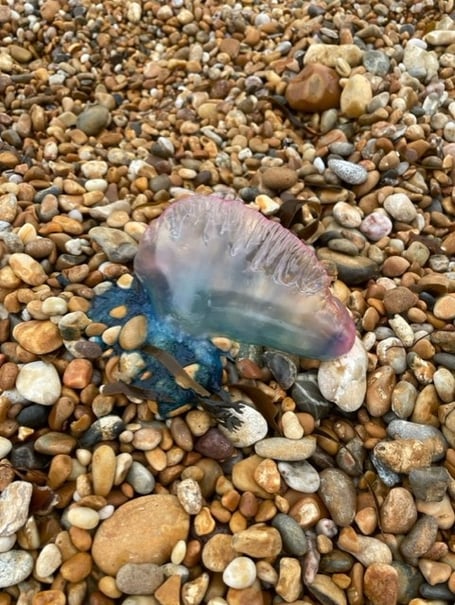There have been reported sightings of Portuguese Man o’ Wars on Blackpool sands, which raises concerns for dog-owners and parents due to the painful sting that can result from contact with the animal.
Charlotte Jacob was witness to the siphonophore, which are often mistaken for jellyfish, but are actually colonial hydrozoans.
She stumbled across the Man o’ War on October 1st.
Charlotte said: “I encountered the Portuguese Man o’ War on Sunday 1st October, while gathering seaweed flotsam on Blackpool Sands Beach, which is a routine part of our seaweed business operations. This specimen had been stranded on the shore. I would envisage that it has been brought in due to the high winds we had experienced the day before.”
Charlotte, who is co-founder of The Devon Seaweed Company, expressed her unease at finding the sea creature: “I was deeply concerned to see children and dogs playing on the beach near this unfamiliar creature. Given its non-native status and the rarity of encounters, many may not realise the potential risks associated with touching its stinging tentacles.”
The sting of a Portuguese Man o’ War can leave red welts on the skin, and is extremely painful.
If you have been stung by a jellyfish or another sea creature, you should ask a lifeguard or someone with first aid training for help, according to NHS advice.
You should also rinse the affected area with seawater, remove any spines from the skin using tweezers, soak the area in very warm water for at least 30 minutes and take painkillers like paracetamol or ibuprofen.
If you have severe pain that doesn’t subside, have been stung on your face or genitals or have been stung by a stingray, you should go to a minor injuries unit.
If you have been stung and have difficulty breathing, chest pain, fits or seizures, severe swelling around the affected area, severe bleeding, vomiting or light-headedness or loss of consciousness, you should call 999.





Comments
This article has no comments yet. Be the first to leave a comment.